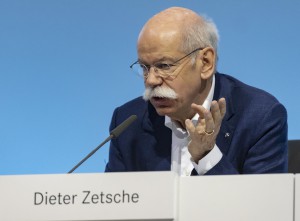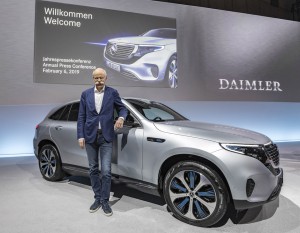
Daimler AG Chairman Dieter Zetsche fields questions from the media during the company's annual earnings press conference.
Daimler AG said its fourth-quarter operating profit fell 22% as trade wars and ballooning costs for developing electric and self-driving cars took a bit out of the company’s profits.
The German automaker’s earnings before interest and tax or EBIT dropped to 2.67 billion euros in the fourth quarter, falling short of analyst expectations of 2.92 billion euros.
Mercedes-Benz said increased tariffs on vehicles imported from the United States to China and delivery stoppages for individual diesel models hit demand and resulted in weaker prices.
For the full year, even as its unit sales and revenue increased in 2018 Daimler net income fell by 28% in 2018, forcing the company to slash its annual dividend by 11%.
(Mercedes-Benz eyes construction of new plant in Egypt. Click Here for the story.)
“For Daimler, 2018 was a year of strong headwinds – with the ongoing diesel debate, the changeover to the new WLTP test method and the global trade dispute,” said Dieter Zetsche, chairman of the Board of Management of Daimler AG and Head of Mercedes-Benz Cars.
“All of this is reflected in our financial results and our share price. Nonetheless, we faced those headwinds and made substantial progress on key areas for the future.”
In 2019, Daimler assumes that unit sales will increase slightly with new models in all divisions and the continuing development of automotive markets. Based on the expected sales development, revenue is expected to increase slight, officials noted.
However, earnings will be adversely affected by ongoing advance expenditures for the models and innovative technologies as well as significant increases in raw-material costs and exchange-rate effects. In a still-volatile environment, Daimler expects a slight increase in Group EBIT for the full year, officials said.
The Group achieved earnings before interest and taxes of 11.1 billion euros in 2018, which is significantly below the prior-year level of 14.3 billion euros in 2017. Net profit decreased to 7.6 billion euros from 10.6 billion euros. In the previous year, net profit was boosted by 1 billion euros due to the one-time effect of the US tax reform. Earnings per share decreased to 6.78 billion euros from 9.61 billion euros in 2017.
(Click Here for details about Daimler investing $20B into electric cars.)
Daimler increased its unit sales in 2018 by 2.4% to 3.4 million vehicles, thus achieving its growth target.
Specifically, the Daimler Trucks division increased sales by a healthy 10%, Mercedes-Benz Vans increase unit sales by 5% and Daimler Buses by 8%, confirming the unit-sales forecasts made at the beginning of the year 2018.
With a sales increase of 0.4%, Mercedes-Benz Cars was setting a new record. Despite difficult conditions, the division sold a total of 2,382,800 vehicles. With unit sales of 2,252,800 vehicles, the Mercedes-Benz brand was once again the strongest-selling premium brand in the automotive industry
Due to difficult political and economic conditions as well as various extraordinary expenses in the divisions, the development of earnings in the year 2018 did not reflect the ongoing strong demand for vehicles.
The significant increase in EBIT at the Daimler Trucks division did not offset significant decreases in earnings at the other divisions. Above all, the Mercedes-Benz Cars and Mercedes-Benz Vans divisions did not achieve their earnings of the previous year.
(To see more about Daimler AG’s restructuring plans, Click Here.)
In both Mercedes-Benz cars and Mercedes-Benz Vans, earnings were reduced by, among other things, advance expenditures for new technologies and vehicles, increased raw-material prices, expenses in connection with ongoing legal proceedings and measures taken for diesel vehicles. At Daimler Trucks, higher unit sales in the NAFTA region were the main driver of the earnings improvement.


